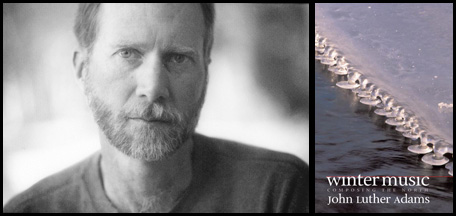This week’s Throw-Back-Thursday post is dedicated to composer John Luther Adams. Below you’ll find a passage from his 2004 book, Winter Music: Composing the North.
John Luther Adams, who received the 2014 Pulitzer Prize for Music, for his symphony Become Ocean, is a widely praised composer, and author of two books published by Wesleyan: Winter Music and The Place Where You Go to Listen: In Search of an Ecology of Music. Adams is the subject of a recent Radiolab podcast, which aired earlier this month on WNYC . Give it a listen if you are interested in “all the forces at play in Adams’ work,” or in “the dark majesty of Adams’ take on the apocalypse.”
From Winter Music. “Love the Questions”
John Cage said that in the course of his life and work he gradually came to understand composition ‘‘not as the making of choices, but as the asking of questions.’’
Morton Feldman put it even more succinctly, when he advised simply: ‘‘Love the questions.’’
The most important questions in music and in life may turn out to have many answers, or no answers at all. In any case, the questions may well be more important than the answers.
Varèse had a maxim for composing: ‘‘Keep it level, especially in times of invention.’’
Lou Harrison has written: ‘‘When I find myself inspired I enjoy it—but, I try to lay the pencil down, for, if I continue, I know that I shall have to use the eraser in the morning.’’
Although the music of Cage, Feldman, Varèse, and Harrison sounds nothing alike, all four composers speak of a healthy mistrust of ‘‘inspiration,’’ ‘‘self-expression,’’ and the artist’s ego. In very different ways each of them placed his faith in something larger than his own will and intentions: a deep belief in the power of the music and the sounds themselves.
In my own work I try to follow a similar path. I try to ask as clearly and directly as possible a few essential questions about the music at hand. Once I articulate these questions, my discipline is simply to keep faith with the musical materials, to listen carefully to the sounds and follow wherever they might lead me.
# # #
Wesleyan University Press and Wesleyan University’s music department are well known for their commitment to experimental music. Our press has published a number of John Cage titles. John Cage Was, by James Klosty, is newly available. Cage was an assistant professor in Wesleyan’s music department, collaborating with members of our community from the 1950s until his death in 1993. Our press also published Alvin Lucier’s Music 109 (now available in paperback), aptly named after his Wesleyan course “MUSIC 109: Introduction to Experimental Music.” Lucier is the John Spencer Camp Professor of Music, Emeritus, at Wesleyan. Another recent retiree from Wesleyan, Anthony Braxton (Emeritus, Faculty of Music), continues his musical life with the Tri-Centric Foundation. You can read more about Wesleyan University’s music department here.
This weekend (October 11), Wesleyan’s Center for the Arts will host a performance by the Vijay Iyer Trio. Vijay Iyer was described by Pitchfork as “one of the most interesting and vital young pianists in jazz today.” The trio also includes bassist Stephan Crump and drummer Tyshawn Sorey (Wesleyan, MA ’11).
In the brief piece above, “Love the Questions,” Adams considers the virtues of letting music itself take the lead while composing. Experimental music allows listeners to consider sound and art in ways they might never have imagined. Wesleyan remains committed to facilitating such artistic innovation. Experimental music has certainly enriched the cultural life at Wesleyan University. We hope our readers will enrich their own lives through experimental music.







